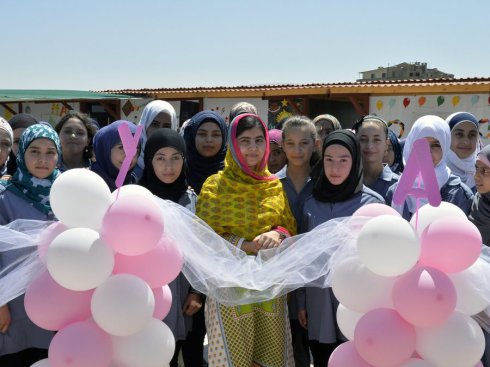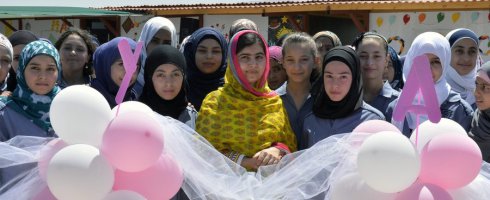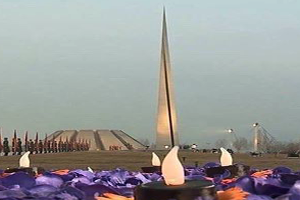Gender-based violence against Syrian refugees in Lebanon
International Rescue Committee identified three main challenges facing Syrian female refugees; first, sexual exploitation and harassment; second, the increase in domestic violence which makes them feel that their homes are not safe; and third, early and forced marriage. Although, local and international NGOs are doing their best to overcome on these crises but still more is needed to be done.
Syrian refugee women are sexually harassed wherever they go on a daily basis. They are harassed while going out to buy bread, walking the streets, going to school, and even while going to the bathrooms inside the camps. Some argue that overcrowding and the lack of privacy for women (don’t have access to separate toilets or showers) are another reason for sexual harassment for the Syrian women refugees.

Malala Yousafzai celebrated her birthday and the opening of a new school with with Syrian refugees in Beqa, Lebanon
Sexual harassment and exploitation:
According to Hiba Abbani, project coordinator at the women rights NGO, KAFA, many Syrian women refugees also face harassment when they seek access to services. For example, women who are perceived as better looking than others are provided with aid packages before others and may sometimes be asked for favors in exchange for that aid. Health and medical services are also used as tools of exploitation. According to Lama Naja, Emergency Response Program Manager at the gender equality NGO, ABAAD, sexual harassment is committed by relatives of the survivors or people within the camps, as well as people outside the camps, Lebanese and Syrians alike. Although Lebanon to some extent compared to other Arab countries, has relatively progressive laws related to domestic violence. However, women and men are still treated unequally under Lebanese law and there is little indication that Syrian and Palestinian-Syrian refugees are able to access the court system to enforce their rights when they are victimized.
Domestic violence:
Moreover, the root cause of domestic violence is not anger, but a deeper structure of power that attributes masculinity to men. Most Syrian refugees come from a rural background where patriarchy plays important role in their society. Here it’s important to mention that daughters have been subjected to violence by their fathers or elder brothers. This pushes Syrian girls to escape from the refugee settlements and sometimes being exposed to more dangers.
Forced or early marriages:
Traditionally, ‘early marriages’ have taken place in the region but aid agencies assert that there has been a “significant increase” in Syrian refugees. Maria Semaan, program coordinator of the Child Protection Program for Lebanese women’s rights NGO KAFA Violence and Exploitation, identified that early marriage is rooted in religious and cultural traditions. “Early marriage is related to traditions and culture,” said Semaan. “All the religions here allow it, so it has become a tradition or at least culturally accepted. At the same time it is, considered a way to prevent sexual intercourse before marriage.” But in this case Semaan believes that economic factor plays prominent role.
Thus, Syrian families justify their action by saying that they need arrange these marriages in order to protect their daughters or to decrease some of the economic hardship they face. However, instead of protecting women, they face domestic violence.
According to NGO interviewees, many Syrian families are using their daughters as trafficking material, and a commodity that can be exchanged for goods, rent, favors and food.
Economic instability also makes women vulnerable to sexual exploitation and abuse by aid workers, forced and coerced prostitution, and trafficking. ‘Families are desperate and ready to do whatever it takes to survive,’ a senior Western aid official in the Lebanese capital Beirut said. ‘Women or girls are undertaking a temporary marriage in return for money or sponsorship such as a visa agreement or residency”.
According to a study conducted by St. Joseph University, 24 percent of Syrian refugee girls in Lebanon are getting married before they turn 18. Impoverished parents there often see no choice but to find husbands for their daughters, even though taking to such steps puts the girls at serious health risks, in addition to denying them education and economic opportunities.
Hurriyah, a 12-year-old who fled to Lebanon with her family three years ago from Idlib, used to attend school but her father was worried because she had become the subject of gossip after a 17-year-old boy began following and harassing her. Hurriyah’s father said that he intends to arrange a marriage to her daughter with a man to protect her. Another example of forced marriage is the case of Nour. Nour, 13 years old Syrian refugee girl was forced to marry a 27-year-old man, her parents told UNICEF that the two couples didn’t met before the marriage and they were forced to arrange this marriage for pure economic reasons, since her father was not able to take care of her.
Can we overcome these crises?
Reuters reported that there are around 500,000 Syrian school-age children in Lebanon, only a fifth of them are enrolled in formal education. Although the Lebanese education ministry announced “Back to School” campaign that would provide free education for up to 200,000 Syrian refugee children but still many Syrian refugee children are spread in the capital and prefer begging in the street and help their families rather than go to school. Furthermore, international and local humanitarian NGOs are collaborating with municipalities to ensure the safety of refugee women. Here it should be noted that the Lebanese legal system can’t protect Syrian women from domestic refugees.
The Lebanese government with the cooperation of international and local NGOs can take certain steps to overcome these crises. First, the number of safe spaces for women and girls (bathrooms…) should increase in the refugee tents. Second, NGOs must organize lectures and workshops having educational protection messages for women and men. Third, build clinical centers for survivors of sexual assault and track sexual violence in the refugee settlements by co-operating with municipalities. Forth, provide awareness sessions about gender-based violence in bordering villages where large amounts of refugee centers are located. Finally, cooperation is needed between the interior and social affairs ministry so that both adopt a legal mechanism to protect women experiencing sexual or physical violence from their family members
The article was originally published in Nasawyia
Yeghia Tashjian holds a B.A. in political science from Haigazian University in Beirut, Lebanon. He is a Lebanese-Armenian political activist, researcher, blogger and the founder of the New Eastern Politics forum/blog. Currently, he is the regional officer of Women in War, gender-based think tank and research assistant at Armenian Diaspora Research Center, Haigazian University. You can follow the author on Twitter @yeghig.







